Thursday, October 25, 2018
GRRRL Power
Alexandra Petropoulos speaks to the collective of women who are tackling the gender imbalance in music and inspiring younger generations
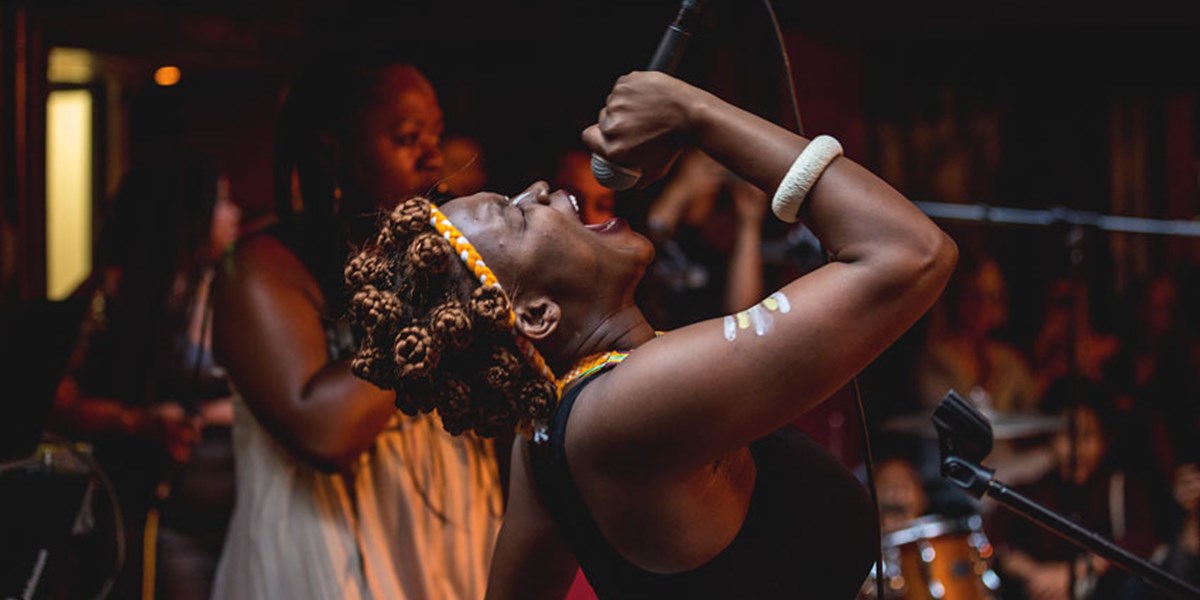
AWA at Ronnie Scott's (photo: Graham Turner)
The numbers are alarming. According to Performing Rights Society (PRS) for Music, only 17% of their membership are women. In its 25-year history, the Mercury Prize has only been awarded to women eight times and only four of the 12 nominated artists in 2017 featured at least one woman in their line-up. The organisation Women in Music’s survey on gender diversity at the BBC Proms shows that women composers only made up seven per cent of the 2017 programme, and only 11% of the conductors were female. The UK Music Diversity Taskforce found that in 2016 while 60% of music interns were female, only 30% of executive level positions are held by women.
It’s not hard to see that there’s a serious problem here: women just aren’t seeing themselves reflected in the music industry. And let’s not even start on the statistics regarding women of colour. The numbers are worrying, but there is one project, the appropriately named GRRRL, that hopes to change the story.
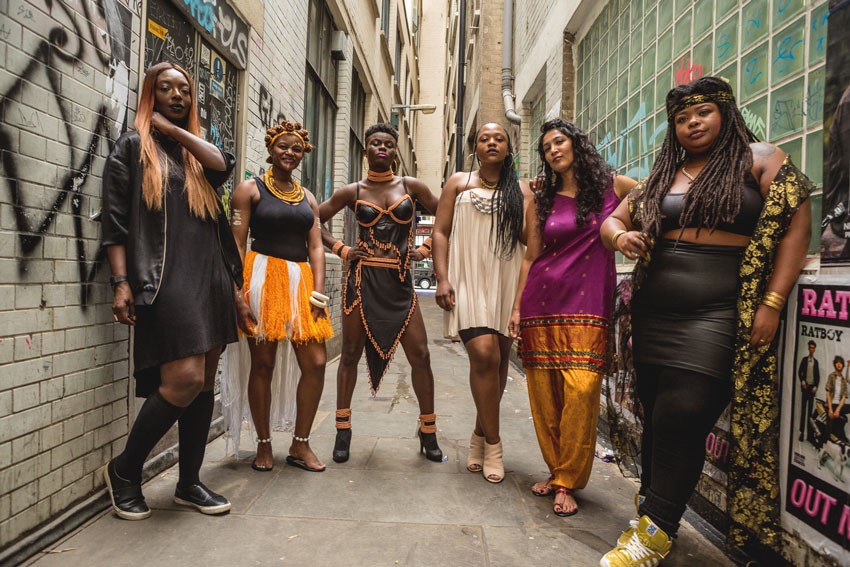
GRRL (photo: Graham Turner)
GRRRL grew out of the cultural organisation In Place of War, which has been working with artists in conflict zones for over 13 years. “One of our pillars of work is around artistic collaborations,” says co-director Ruth Daniel. “We’ve always been fond of the idea of what happens when you bring creative people from very isolated or marginalised communities together, and what their collective voices can do in terms of telling their stories and raising the profile of their struggles. So, over the past few years we’ve been making artistic collaborations happen in lots of different parts of the world. We did this for three years, and then all of a sudden I had this realisation that the people that we were bringing for the collaboration were pretty much all men.”
This realisation sparked deeper research. “We started to look at things like the number of women on festival line-ups, really looking at the situation in the music industry.” What she found was discouraging. (Last year was particularly appalling with women only representing three per cent of headline festival acts in the UK.) As a former musician herself, Daniel understands the challenges female musicians regularly face, “but also, in a lot of the communities that we’re working with, women are really marginalised, suffering from stuff like domestic violence, child marriage…” This inspired Daniel to create a platform for “incredibly fierce and independent” female artists to collaborate and make music on their own terms. Welcome to the world, GRRRL.
Well, almost. In 2016, Daniel and In Place of War started with the precursor to GRRRL, called Voices of a Revolution. It featured 20-odd women of colour from various communities around the world sharing a stage at a handful of UK festivals. “Seeing all of those women on a stage, telling their stories in the way that they want to tell them is a really important thing,” Daniel says. “And it just felt like this doesn’t happen really at all.”
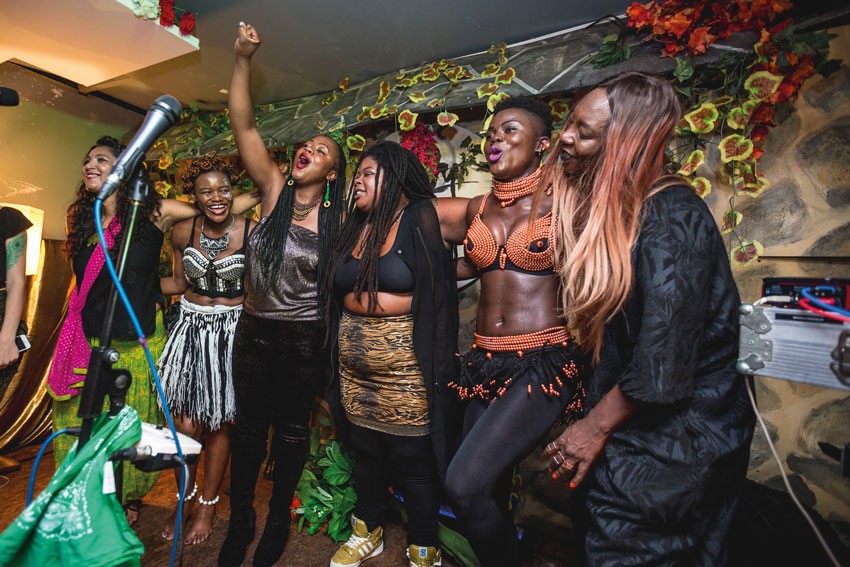
GRRRL at Folklore in Hackney (photo: Graham Turner)
It would be easy for a project with such lofty goals as this to sacrifice musicianship for a cause: to enlist musicians on the basis of their gender rather than ability. Thankfully, this couldn’t be further than the truth. From the dancehall phenomenon Lei Di Dai from São Paulo to Zimbabwe’s rapping force of nature AWA (African Women Arise), the artists  of Voices of a Revolution presented some of the best music I heard at Shambala Festival that year.
of Voices of a Revolution presented some of the best music I heard at Shambala Festival that year.
I wonder how Daniel managed to put together such an impressive roster? “In the past when we select people to work with on a collaboration project, we contact our music connections across the world and then they will send ideas.” The problem with this approach was that these on-the-ground connections usually only sent male recommendations. When it was made clear that they wanted female artists, things changed: they didn’t get as many suggestions. It looked like it would have to be up to Daniel and her team to find the musicians. “We did a lot of research and we started to uncover incredible female artists around the world. And we then started to look at what would make a great group of people, bringing different sounds and influences from different countries. We wanted to create a sound that sounds like nothing else.”
With artists from Venezuela, Brazil, Zimbabwe, Ghana, Egypt, Colombia, Bangladesh, the UK and everywhere in between, Voices of a Revolution was a success. Their performances were powerfully engaging and innovative, and panel discussions with the artists were a welcome and rare opportunity to hear these women’s stories. It only made sense for the project to grow into something more solid.
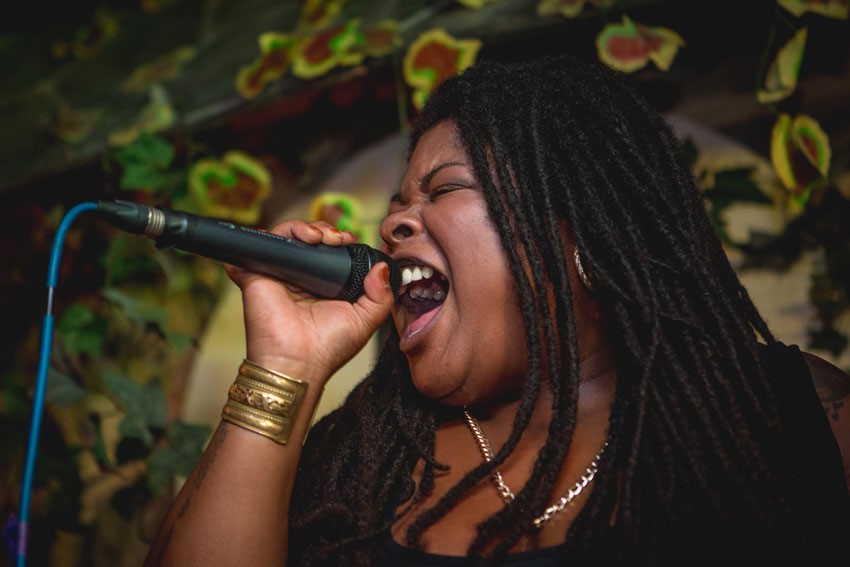
Lei Di Dai at Folklore in Hackney (photo: Graham Turner)
Featuring many of the same artists in a more refined and unified project, GRRRL premiered at London’s Ronnie Scott’s on August 23, 2017. This time the group was directed by Brazilian producer Laima Leyton, who helped provide a musical framework to which the other women could bring their own ideas and influences. In the intimate space of Ronnie Scott’s, returning artists AWA, Lei Di Dai, Ghanaian singer Wiyaala, British-born Ghanaian electronic artist AFRODEUTSCHE and British-Bangladeshi singer Sohini Alam were joined by Mercury Prize winning rapper Speech Debelle and Cape Town nu-jazz singer Nono Nkoane for a powerful performance that blew the packed room away.
Looking every bit like a young Grace Jones, Wiyaala beams at me from her home in Ghana as we Skype. I ask her about what it was like to work with GRRRL. “When I got the opportunity to work with an all-female group of strong women... Man, I was, like, wow! It’s just what I wanted to do.” A dynamic and imposing force on stage, she is nothing but charming in person and is enthusiastic about her involvement – “it was just fantastic. The most amazing thing is it’s just all women!”
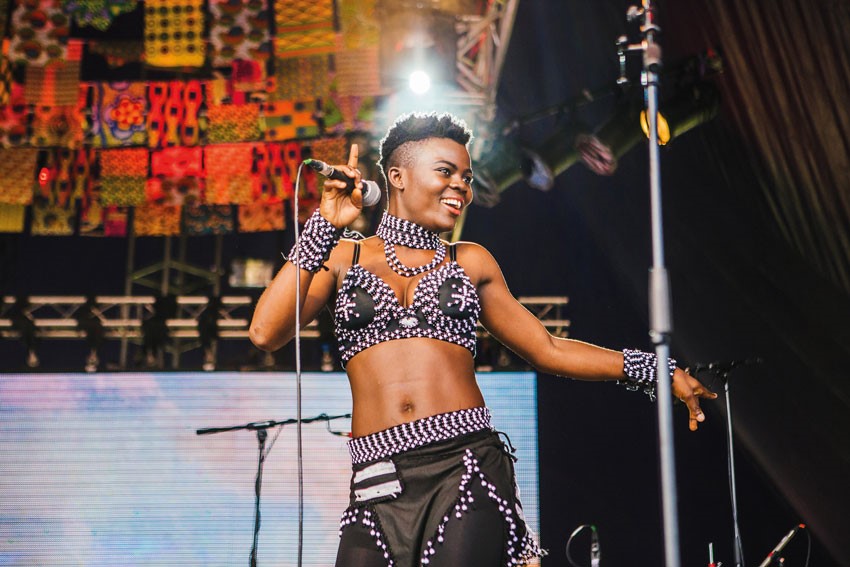
Wyaala at Shambala 2017 (photo: Louise Roberts)
Under the direction of Leyton, the women of GRRRL each worked together to create music in impressive time; they only had six days of rehearsal. How easily the group worked together was one of the things that surprised Sohini Alam: “I had no idea what to expect… I have to admit I was a bit worried about that many women with such strong personalities being in one place and working together without any clashes. I was pleasantly surprised. Everyone really got into the swing of working as a team, each of us playing to one another’s strengths.”
Alam is no stranger to collaboration, in fact she speaks to me during a quick break in rehearsals for Akram Khan’s Until the Lions in which she performs when not singing with Lokkhi Terra or her own group Khiyo. “This is how I normally work. I like collaboration. I like working with other strong artists. I think what it does is it makes me stronger as an artist, because if you’re surrounding yourself with incredibly talented people then it helps bring out the best in you.”
“That’s the beauty of collaboration: you come together to do something that each of you cannot do on their own,” Zimbabwean rapper AWA echoes Alam’s sentiments. “You get to learn from each other’s stories. You get to be inspired by how others move, how others perform, how others create.”
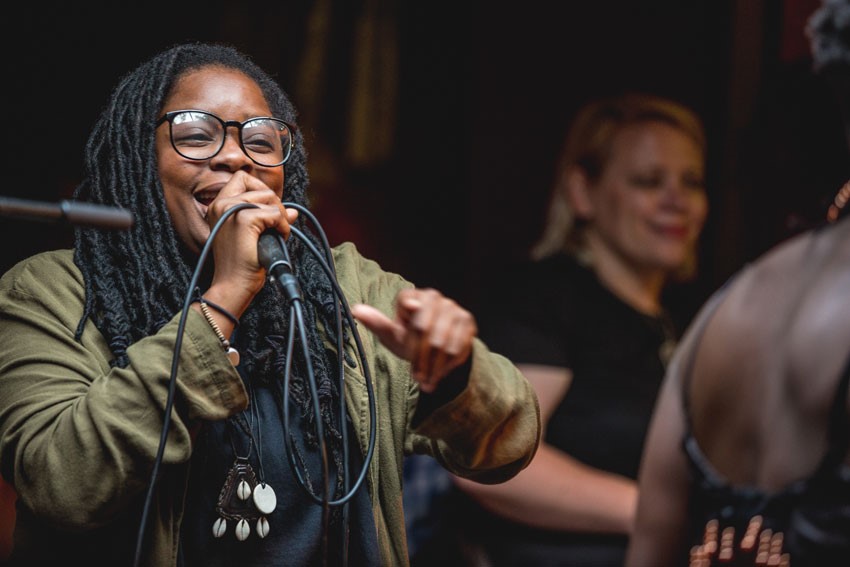
Speech Debelle at Ronnie Scott's (photo: Graham Turner)
When the group take to the stage it’s hard to know where to look. Between AWA’s fierce rapping, Lei Di Dai’s grizzly vocals or Speech Debelle’s spoken word, each woman steals the show in her own right. What is clear is that there’s a lot of talent crammed onto one stage and the buzz that creates is infectious.
Envisioned as an evolving collective, with an ever-changing line-up of directors and artists, GRRRL has found its framework as a platform for talented women and is quickly being propelled onto an international stage. They are already booked to perform as part of the closing ceremony of the Commonwealth Games in Brisbane, Australia on April 15 and are due to release their first EP in June.
But as good as the music is, what makes GRRRL particularly special is GRRRL Roots, an extension of the project that aims to bring the revolution back to the community. “Each of the women has sent a project idea that they would like to run in their communities with women and girls,” Daniel explains. “The idea is that they’re out telling their stories on a global platform, really highlighting the issues that affect them, but at the same time they’re back in their communities amplifying that impact; to help empower women and girls in communities across the world through the creative projects that they’ve identified.”
From a cultural space in Lei Di Dai’s favela of São Paulo to a programme that helps teach women and girls how to use technology to create film and videos in Wiyaala’s community, GRRRL Roots ensures that the impact on women in music reaches far beyond the stage. “These are women who are women of colour,” Daniel says, “who’ve come from marginalised communities, who are showing other women and girls, that it’s possible to do this. It’s possible to have this voice. And I think that gives a lot of people hope. Hopefully we’ll inspire new generations of women.”
It’s clear when speaking to each of these women that it’s this movement, this campaign to put women on an equal footing in a creative space, that fuels them. Alam believes the importance of GRRRL lies in showing the world that women too can be fully realised artists, not just pop stars: “I think what’s cool about GRRRL is that there was no feminist agenda. It was quite simply picking people whose lives, work and music are feminist in nature simply because women don’t often get on stage.”
“We have to keep [GRRRL] going,” Wiyaala says, “because it means a lot to young women. Every young girl who is hiding somewhere, or for difficult reasons can’t get out there, can look up to GRRRL and know that, yes, women can do it. When women come together and work together, we can do it.” 
+ This article originally appeared in Songlines #136. To find out more about subscribing to Songlines magazine, please visit: Subscribe

